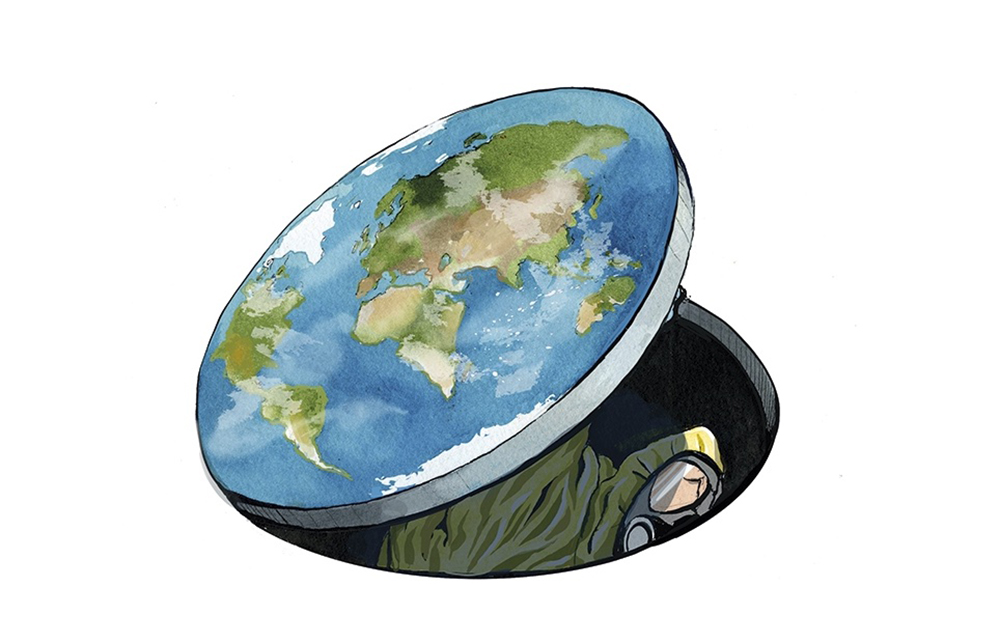Look, I realise you don’t want to read this column. I’m unenthusiastic about writing it. For most of us, any mention of Covid triggers a deep aversion and desperation to flee. Even recalling the uncanny tranquillity of the first you-know-what – the blue skies, the blazing sunshine, the serene silence in once-bustling London – makes me wince. Between the slow drip-feed of the Telegraph’s Lockdown Files and Rishi Sunak’s dubious Protocol breakthrough, most UK news consumers would have greeted last week’s headlines with a double-whammy of ‘Oh, no, not that again!’ – since the only subject that rivals Covid’s revulsion quotient for Brits is Northern Ireland.
Waves of variants came and went, oblivious of state diktats. Nature prevailed, as nature is wont to
From the start, I anticipated our allergic reaction to reflecting on an era we’d be frantic to forget, which is why I didn’t use my graciously state-sponsored leisure to write a ‘lockdown novel’. While numerous colleagues chose to do so, I was certain the genre would prove commercial poison. Book-buyers wouldn’t want to go back there. Sure enough, The Year I Didn’t Leave the House has yet to hit the bestseller list.
Still, the period does strike fictional notes. Stories from Frankenstein to Stranger Things to the myth of Pandora’s Box employ a timeless plot device: letting something malign into the world and then being unable to send it back where it came from. I don’t refer to the virus itself. As the former health secretary’s WhatsApp messages remind us, with their relish of fostering public terror and their casual concoction of politically motivated if socially ruinous made-up rules with no basis in data – none of this stuff is surprising – what ‘liberal’ democracies let irretrievably into our world was tyranny.
We are forever changed. The British people, along with the populations of many American states such as New York and California, have henceforth to live with the fact that civil liberties we Yanks call ‘inalienable’ can be cancelled at a moment’s notice for years on end. Our ‘rights’ are alienable as can be. We’re often warned that democracy is fragile. Lo, that turns out to be horribly true.
Which is why indulging our aversion to all things Covid with a wilful amnesia – blanking out two years of our lives as if redacting the calendar with black marker – is a mistake. The pols, media shills and limelight-basking scientists-for-hire complicit in grievously wounding our lives and countries have good reason to hope that we forget all about that little unpleasantness. But I need to remember, if only to understand myself – why post-pandemic I’m so much more cynical, misanthropic and pessimistic about the future.
Given the perfect absence of any correlation whatsoever between the severity of restrictions and Covid mortality rates, even when comparing like regions with like, it’s probable that this plethora of ‘interventions’ that made our lives hell while making a mockery of representative government – all those ludicrous ‘tiers’, the Harry Potter-ish ‘rule of six’ – made not the slightest difference to the death toll. Waves of variants came and went, oblivious of state diktats. Nature prevailed, as nature is wont to. We’d have been far better off if governments had done absolutely nothing.
This perspective has gained in currency. Some longstanding lockdown critics are resentful that many former establishment cheerleaders are now pretending they also opposed these failed and disastrous policies at the time. I’m not resentful. If you’re late to the party, welcome to the party. For the threat far greater than a handful of recent converts lying to themselves about their previous bovine compliance is the state’s self-interested company line surviving intact.
Most ordinary people still believe that lockdowns, and the accompanying bramble of insensible, ever-changing and medically illiterate Covid restrictions, saved hundreds of thousands of lives in the UK, millions in the US, and tens if not hundreds of millions worldwide. The ‘narrative’ may have bent ever so slightly, but it’s holding up. To my utter astonishment, when a new YouGov poll asked Britons how they assess their government’s handling of Covid-19 in hindsight, 34 per cent said ‘About right’ and 37 per cent said ‘Not strict enough’ (incredulous italics added). A mere 19 per cent said ‘Too strict’. A full 54 per cent of Labour voters still think the ‘measures’ (a word I’ve come to hate) should have been even more brutal.
This matters. True, last week, numerous journalists joined the chorus of ‘never again’. Yet meanwhile the WHO is contriving two agreements whereby countries will ‘undertake to follow’ this unaccountable supranational organisation’s ‘recommendations’, including imposing lockdowns, vaccine mandates and passports, border closures, mask-wearing (never mind how ineffective) and whatever else these bureaucrats might dream up – all over the heads of nation states.
As currently conceived, these agreements would make WHO edicts not merely advisory but compulsory. Tucked in China’s pocket and dependent on Big Pharma, the organisation that during Covid promoted both a string of falsehoods and the ghastliest of policies would arrogate to itself a budget of up to ten times its current one. It’s seeking the power to repeat its mistakes not only when confronting a verifiably lethal organism, but when confronting an organism that might prove deadly in future. Thus the WHO could soon be able to shut down the whole world over a pathogen that turns out to be as dangerous as cheese mould – just in case.
So we might not like to think about lockdowns any more, but public-health poohbahs are delightedly thinking about lockdowns all the time. In the end, the only thing that will defeat their designs on our happiness and prosperity is to refute their beloved ‘narrative’. Despotic social controls did not save millions of lives. This notion that gelling whole populations in aspic amounted to a grand altruistic rescue is a myth even more pernicious than Trump’s ‘big lie’ that he won in 2020. Lest we invite more of the same, it’s paramount that our authorities’ hysterically disproportionate reaction to Covid be universally regarded in rueful retrospect as the most catastrophic public-health debacle in history.







Comments